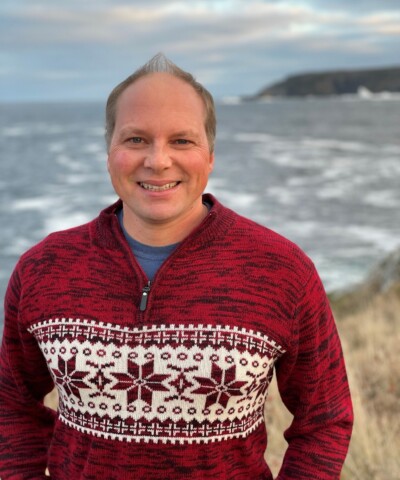Our Volunteers

Travis Van Leeuwen
Meet Travis Van Leeuwen, a member of our Newfoundland & Labrador Advisory Committee
Meet Travis Van Leeuwen, a member of the Newfoundland and Labrador advisory committee.
Hailing from Port Moody, British Columbia, Van Leeuwen grew up on the water and pursued an interest in fish and aquatic lifeforms to a PhD looking at life history strategies in salmonids. He spent the formative years of his career with the Cape Eleuthera Institute in the Bahamas, working with small scale, commercial and emerging fisheries.
In 2018 he started work with the Department of Fisheries and Oceans as a research scientist in the salmonid section, providing assessment on the numbers of salmon in monitored rivers. More recently, he has started taking an interest in the realm of catch and release fishing – trying to put numbers on the survival of fish following catch and release and applying those numbers to the fishery.
“I’m trying to understand what are the main characteristics or survival estimates around catch and release angling for the fishery in terms of warm water protocols and when most of the fish are caught. It goes beyond just understanding what the survival chances of Atlantic salmon are following catch and release, but then applying that to the real-world fishery.”
A co-worker at DFO, Brian Dempson, suggested that Van Leeuwen get involved with the FCAS, seeing it as an ideal way for a newcomer to the province to understand the passion for salmon conservation and some of the important projects being undertaken in Newfoundland’s watersheds. Van Leeuwen said that the sheer volume of projects and the enthusiasm around Atlantic salmon in the province has been inspiring.
“The proposals that I most like to see are around education and awareness, whether that be teaching school kids life cycles of Atlantic salmon, fly tying and fly-fishing classes and educational efforts in the broader community on the issues facing Atlantic salmon in the province, whether it be climate change or various aspects of the recreational fishery.”
Salmon counting fences are another project that are meaningful to Van Leeuwen, which he says can go a long way to helping DFO assess these watersheds. While DFO have their own counting fences, data from community-led fences supported through the FCAS also factor into their assessments.
“I always like to see those projects go forward. They also get active participation of the community into those assessments so the people can see firsthand the numbers that we’re producing. They actually had a part in that and they can see how much effort goes into actually providing an assessment on Atlantic salmon for the province.”
Beyond the importance of the work itself, Van Leeuwen said that he has also greatly enjoyed the camaraderie that has developed between himself and other FCAS volunteers.
“Being introduced to other people in the region that share similar interests, whether it be fishing or conservation of Atlantic salmon, has been really good!”
